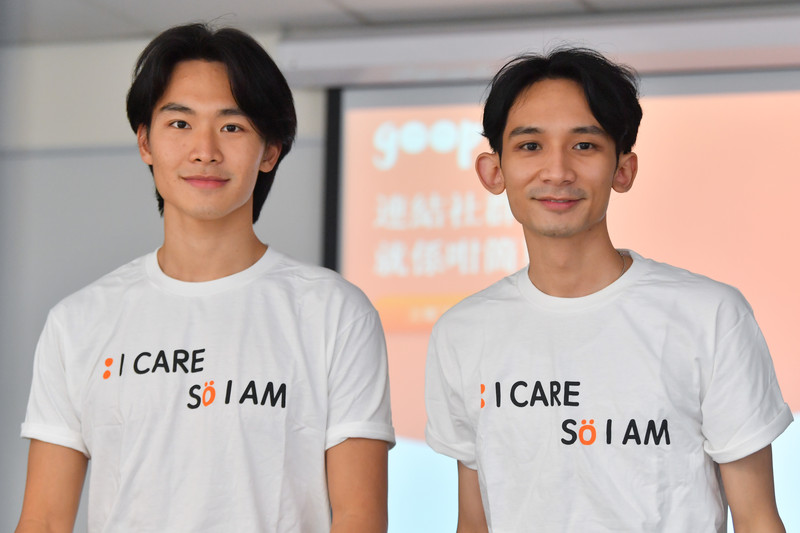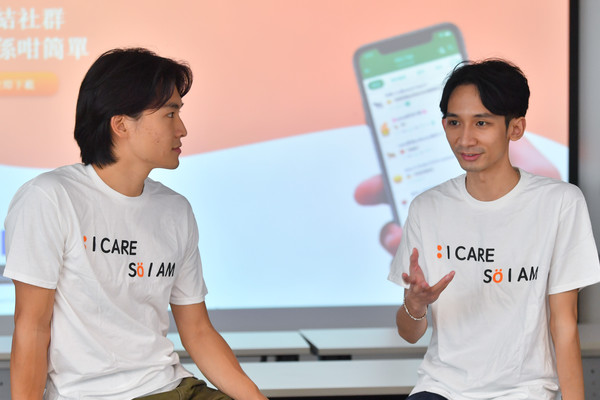
Discovering the holy grail of social media
The Gööp team are bringing online networking back to its roots of being useful to the community and allowing an open forum for ideas. Here’s how…
Hustling from day one
Have you seen promotional leaflets left on the tables at university learning commons? Recalling the days when they first promoted their app, co-founders Jonathan Ching (BBA(IS) 2018) and Kyle Leung (BBA 2019) and laugh that they would wake up at 4am and sneak into the HKU learning commons and put out flyers about the product. “Basically, it was a physical spam mail!” says Kyle. “It was so hard to get people to adopt a new app, so we had to do some major hustling,” Jonathan adds with a laugh.
But what is Gööp? It is a social networking app that connects people on campus within chat groups that resemble WhatsApp – people can enter chats about different topics but participate in an anonymous way if they so wish, using a pseudonym or emoji as an identifier, or toggle between the two identities. The effect is immediate: people are able to engage in freedom of expression without the paranoia of being identified, screen capped or actively doxxed.

A vacuum in the social landscape
“People have joined Gööp as a community they belong. Social media is good for personal needs, but there is not much community sharing or communal feelings, so we targeted group communications. Before this, students had to meet others on public forums, but now they are discovering an exclusive chat space with people with similar backgrounds, and we found a vacuum in the social landscape,” says Kyle.
To prevent spammers, bots, or non-community members joining, a student’s identity needs to be authenticated by the Gööp team. The concept is similar to social media sites such as LIHKG or Reddit, but in an environment that is safer and more useful, as everyone is part of the same social group. “Privacy is protected so when you speak, you don’t need to be concerned – you can imagine on any campus there are many secrets so anonymity is important,” says Jonathan.
Breaking the Apple Watch
After being impressed by their unique form of ‘hustle’, the HKU Student Union helped promote the app and get it noticed across the student body. One day the team were in the office after six or seven months of banging their heads on a brick wall, “my phone started buzzing thousands of times – we gained 2000 users in one night and it broke the Apple Watch of my teammate because it vibrated so much!” says Jonathan.
It was the moment of ‘critical mass’, and the team found themselves going viral across campus in Hong Kong. The concept became part of the normal life of university students – if you are an undergrad in the city, you need to be on Gööp. With social media sites such as Facebook and Instagram rife with bots, monetisation, bullying and self-promotion culture, Gööp goes back to the heart of what social media was supposed to do – be a safe place for communities to share information. “We have become an alternative social media platform to the likes of Facebook and Instagram, people feel carefree to say things without embarrassing themselves and being judged and identified,” says Kyle.
A safe haven from doxxing culture
Gööp has thus become a safe haven from so-called ‘doxxing’ culture on the internet. It is an example of closed network social media or micro scale networking, where people can create topics that are useful to students, such as how to get into a certain hall of residence or course. The app has approximately 80,000 registered users and the number keeps growing.
The team are now setting their sights on the high-school market, and are growing as well, along with a small team in Indonesia, another market that they want to enter with around three million university students in the country. But has the current pandemic been a problem for the team? “It has actually boosted our numbers, people are spending more time online” says Jonathan.

Gööp recently launched the “Ask Me Anything” campaign in collaboration with HKU Admission Office. The campaign aims to connect HKU Student Ambassadors with HKU freshmen-to-be across the high school communities. “Over 900 messages were generated over a 4-day campaign. I think it is also the first ever chat engagement platform directly between HKU and its potential students.” says Kyle.
Like many successful start-up stories, the alma mater has been essential. HKU Business School provided the team with the technical abilities to build and market the app, and the inspiration to make it happen. “We are grateful for HKU’s connections with mentors and media, and also the space at iDendron that allows us to save so much money,” Kyle says. It’s a sentiment added to by Jonathan: “Resources aside, HKU allowed us to meet like-minded talented individuals to make our dreams a reality, and magic is happening.”





